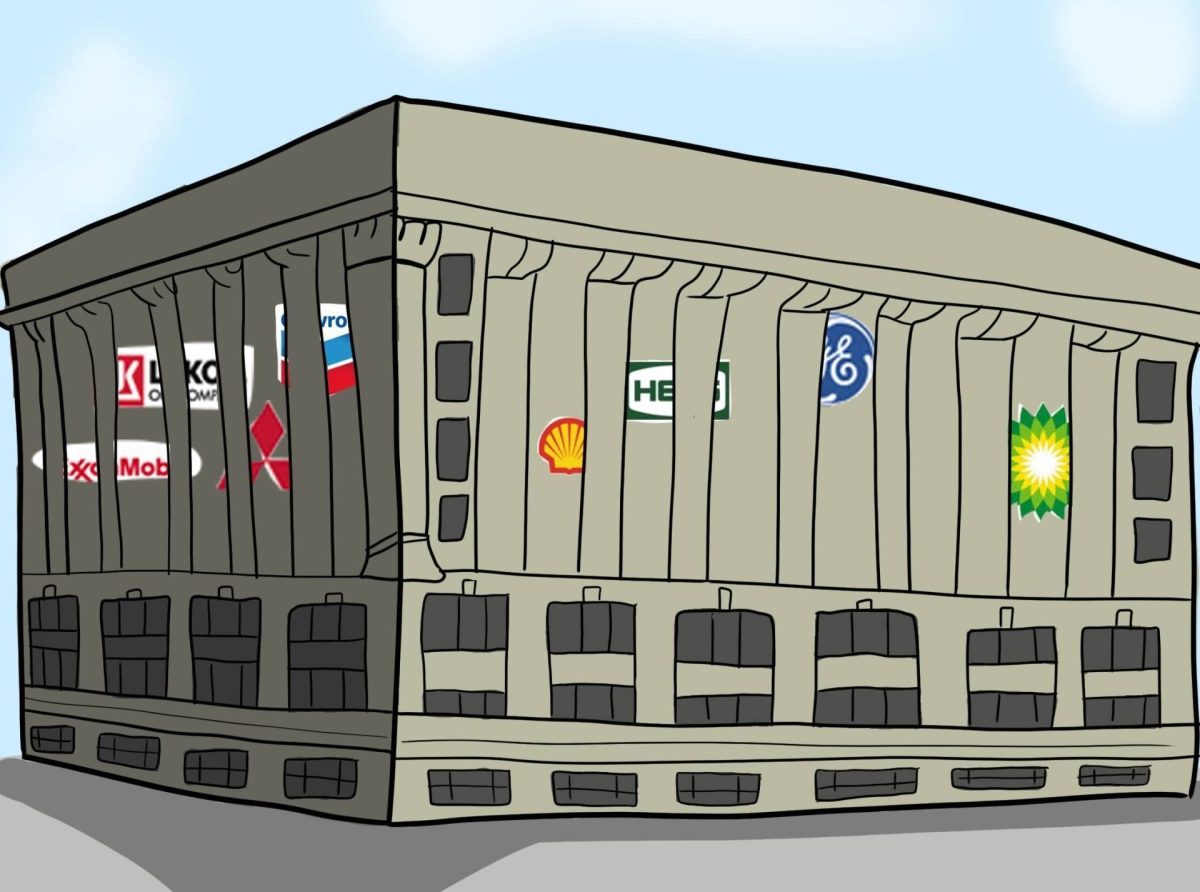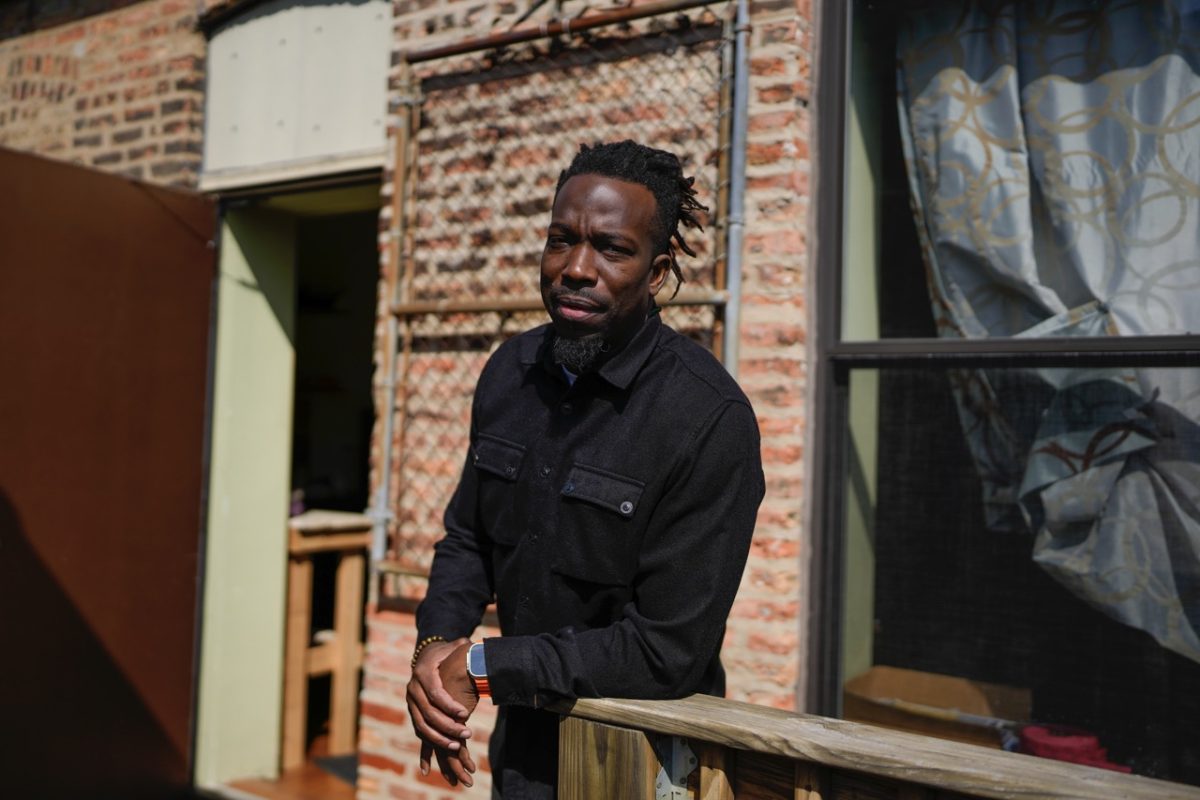Shrouded in the hazy shades of winter, DePaul was only a few weeks into the 2006 school year when administrators were faced with a racial conundrum. Students were returning to their studies and settling in for the winter quarter in January, and, to bring attention to the DePaul Conservative Alliance (DCA), a new club at the time, members held an affirmative action bake sale in the Student Center.
The bake sale was designed as a metaphor for the perceived unfairness of affirmative action. White and Asian males, who were deemed the top of the racial hierarchy, were required to pay $1 for goods. The price for White and Asian females, the second highest group, was 75 cents. For those at the bottom of the list — which included African American, Hispanics and Native American females — 25 cents was the suggested price, which were marketed at a lower rate to “address affirmative action.”
“”It’s ridiculous to charge cheaper brownies for minorities,” Michael O’Shea, president of DCA at the time, said to The DePaulia.
The scene had some similarities to what happened last spring at DePaul. The sale led to peaceful protests and a heated conversation. Public Safety largely stood back and a conversation about race and free speech occurred on campus.
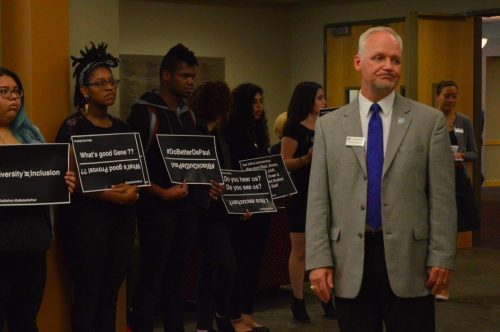
The purpose of the metaphor was to entice a conversation on affirmative action, but the result, for Valerie Johnson, chair of the political science department, created a racial rift that the school has grappled with in some shape or form every year since. The bake sale, she said, “demonstrated that the university never effectively resolved the issues raised by (the bake sale). Then and now the issues are free speech versus hate speech.”
“Ten years later the university is still grappling with its position on the matter,” Johnson said. “This fact manifests a deep pathology that creates a situation where racial tensions are always perilously beneath the surface.”
An event happens and the university issues a response — speech and expression guidelines, an email, an action plan.
In spring, after Milo Yiannopoulos visited the university, administrative officials conducted a listening tour. They went from faculty to staff to students to hear concerns and suggestions on how to make the university better, and are developing and implementing initiatives for the 2016-2017 school year. The most notable of these changes is the Race and Speech Action Plan, announced in September.
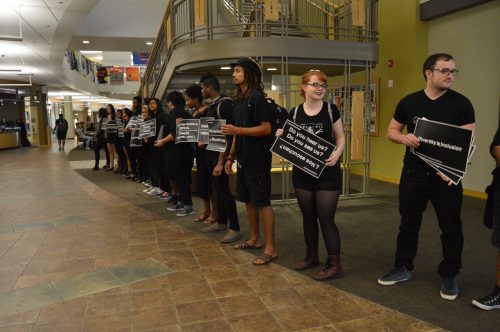
Vice president of the office of institutional diversity and equity Elizabeth Ortiz said in an interview with The DePaulia that the plan was in the works before spring, but it has been seen as a direct response to Yiannopoulos’ visit and the various related events that happened in the last weeks of spring quarter.
“The Milo event did not only expose tensions among students, it also exposed issues related to faculty and staff,” Johnson said. “There is a growing discontent and unrest on DePaul’s campus.”
Though Yiannopoulos’ visit may seem to some the only racial incident of the year, there were other events that preceded it that lead to the tensions, and their overflow in spring. Some pointed to microaggressions in the classroom and to a heated discussion on a Facebook post where students used racial epithets. During the incident itself, students were called monkeys. After, many were harassed on social media and a noose was reportedly found on campus.
“There were tensions prior to spring,” Suzie Brito, a junior and member of the Lambda Theta Alpha Latin Sorority, Incorporated, said. “Because of (Yiannopoulos) and the election, it brought out a different crowd of people and made those who agree with (his) beliefs feel comfortable saying them.”
Speech at DePaul, and the line between what is allowed and tolerated and what is not, has not been clearly defined, though the speech and action plan does include it on the calendar of events to address, but it is currently listed as done.
In addition to the plan, the university also planned a speaker series and released a calendar of events. Both have been criticized for not doing enough and not creating a well-rounded atmosphere for students to engage in discourse with each other. Jose Pereyda, a fifth year student, said that the speaker series is smart, but the people who he believes need to attend won’t.
“What happened last spring went completely against (what DePaul claims to be),” Pereyda said. “I hope other students of color don’t have to go through it again. I hope it doesn’t get worse. To have a more open minded school we have to take all opinions into consideration.”
To bring in more opinions, the administration has drawn ideas from students in implementing changes and parts of the speech plan. Administration officials have said that the speech plan is a work in progress, but bringing more minority students into discussions, and ensuring those discussions are fruitful isn’t something that has to be, some have pointed out.
“It takes a complete re-examination of the structure that exists. We don’t do everything perfectly at DePaul. However, we do many things well,” Michael Lynch, senator for intercultural awareness for the Student Government Association (SGA), said.
“Being honest and receptive to critiques and criticism, coming from all sides, is extremely important. As a member of SGA, I can say from the conversations I’ve had with administration, that they are at this point. The discussions are being had, the recommendations are being offered, and the school is listening.”
The speech and race action plan provides an overview of the school year to come. Starting last month, one of the first steps listed was to revisit the current guiding principles of speech and expression for possible revision and updating. A team would be in charge of recommending and guiding the revisions.
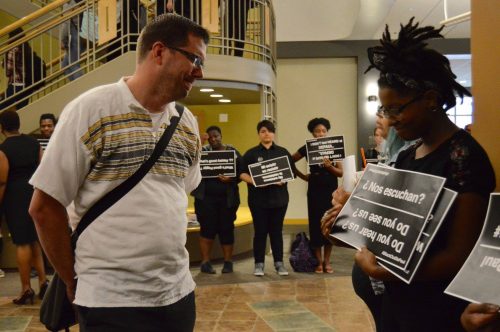
The plan is also set to include a look into the speaker request process for student organizations as well as a study of university-wide bias response teams nationally. A plan to centralize investigations of complaints under the anti-discrimination and anti-harassment policy were also planned for review last month as part of a reassessment of DePaul culture.
In conjunction with the plan, The Office of the President, in collaboration with Academic Affairs, Institutional Diversity and Equity as well as Government Affairs, are sponsoring a race and free speech speaker series to bring in varying perspectives across the political spectrum.
For Eva Swiecki, a DePaul senior, the changes signal a change in tone and approach after the events of last quarter.
“I think that DePaul, in the recent past, has made some poor choices in allowing a hateful discourse a place on the campus,” Swiecki said. “I’m glad that they are (currently) taking steps in hiring a new “diverse” president at DePaul. I hope that they’ll try their best to ensure that DePaul becomes a safe space again for people.”
For Johnson the speaker series, as well as the timeline for the race and speech action plan, doesn’t address long term issues.
“This plan, with a few exceptions, doesn’t impact the day to day racial culture at DePaul,” Johnson said.
To address this, Johnson suggested a teach-in, a mandatory class for students and faculty where professors could teach about issues related to race and speech. No teach-ins have been announced.
Nationally, universities have taken different approaches to handling race on their campuses. Some, like Harvard Law School, have changed seals that prominently display brutal slaveholders or the legacy of slavery and a history built on the backs of minorities. Others, like The University of Missouri , have ousted presidents and other administrators and pledged to address their issues through discourse, something Johnson and Pereyda want to see at DePaul as the university tries to go forward.
Amor Kohli, associate professor and program director of African and Black Diaspora Studies, said that it’s important to recognize that at least now these issues are being addressed, but some issues need more attention. Though the institution is not at the point where they should be patting themselves on the back, Kohli said recognizing what is being done is also important.
“I hope the university sees the need for sustainable change and it takes seriously the idea that these issues need to be discussed and engaged in and out of the classroom, and not only after there has been a problem,” Kohli, associate professor and program director of African and Black Diaspora Studies, said. “These are core issues to our society and our world.”
To create long lasting change at DePaul, Johnson said that more needs to be done to change the day to day culture of DePaul. She and Kohli both said that the university needs to be emphatic about its values and demonstrate what the university values in “sustained and meaningful ways,” Kohli said.
“The university has to strongly demonstrate what and who it values. I would hate for people to think that the university is only talking about this because it has no other choice,” Kohli said. “That’s not to devalue the work of the committed individuals who have been working on the plan and on change in the school, but we have to demonstrate what is valuable to the school.”
Addressing what is of value is also something Johnson talked about when asked what she wants DePaul to do for a better future. Clearer statements on what will be tolerated and what will not, as well as doing “a better job of broadcasting racial values.”
“I wonder if we are who we say we are,” Johnson said in regards to DePaul’s mission and values. “Is that symbolism or practice? There’s a big difference. If we are who we say we are, why not say that emphatically?”
DePaul’s year ahead is a litmus test for how future race relations and racial events will be handled by the administration and to what extent faculty and students can be apart of that conversation. Lynch said he hopes to see DePaul live up to its mission and values and feels the university is capable of doing so. In the meantime, he hopes students, faculty, staff and the administration itself can be willing to have a conversation.
“Know what you want, so when you finally have the opportunity to make it happen, you’ll already be prepared,” Lynch said. “Systemic change isn’t going to happen trading PR statements. It’s going to take both sides coming together, sitting down, disagreeing often, but coming to a conclusion. It won’t be easy but it’s necessary.”



